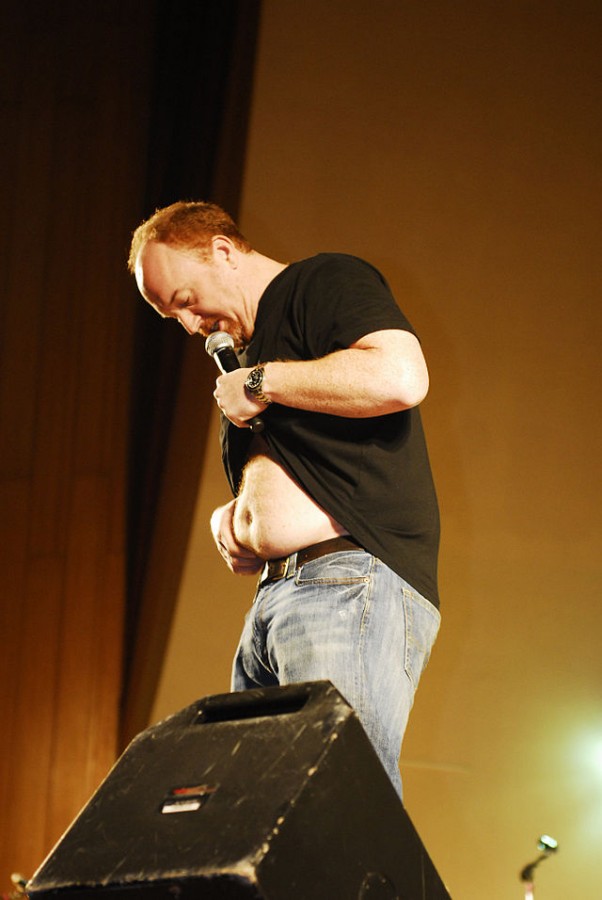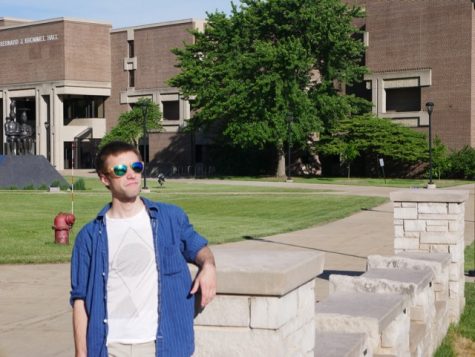Louis C.K. Takes The Chicago Theatre
Photo courtesy Sgt. 1st Class Daniel Ewer
Louis is never afraid to criticize himself on stage.
January 13, 2015
Louis C.K. has embarked on another tour, one which just passed through Chicago on the fifth and sixth of this month, and will have hit both Los Angeles and New York by the time this article is published. Whether you love, hate or are completely indifferent to his act, C.K., hailed in 2014 as the “Undisputed King of Comedy” by GQ Magazine (a title he accepted with a trademark sense of embarrassment and humility), has managed to define himself as one of the great comics of this, and the last, decade. He’s carved a niche distinctly his own: stepping effortlessly through dark, deeply relatable and humanistic subject matter; painstakingly crafted toilet humor; philosophically bent rants on human nature and his own unique brand of bizarre and sometimes obscene absurdist comedy.
Whatever the status of his legacy, the years in which C.K. was supported mostly by a combination of devout fans and small club gigs across the long roads of America have long since passed. The crowd he drew at the Chicago Theater was immense enough to add two late-night shows to Monday and Tuesday—and even those, despite hellish single-digit weather and the cruelly unplowed streets, were almost completely filled.
The crowd huddling before the doors on the cold, snow-swept ground beneath the marquee of the Chicago Theatre was vast and determined. Mostly young,—most were in their mid-twenties to mid-thirties, though some teens and some elder folks peppered the audience as well—they smoked cigarettes and talked amongst each other, some about the upcoming acts at the Theatre and others about C.K. or about the cold, and shivered before the doors opened. When they did, the crowd entered gracefully and without incident.
Chicago-born comedian Hannibal Burress opened the show. He began his act with a reference to the hellish Chicago weather of that day stating, “This is the kind of weather that makes people leave Chicago,” and supposed that numerous people who had bought tickets for the show would opt in for a warm night of Netflix, rather than brave the cold.
The style of Burress, in a stark contrast to C.K., took a conversational tone. It was reminiscent of conversations with a group of close friends—espousing weird situations and complaints, personal stigmas taken from the overabundance of internet pornography and observations made while on the road.
When Louis took the stage, he needed only his appearance in itself and his voice to silence any murmur in the crowd. His voice demands attention. It is clear and acerbic, simultaneously disinterested and irritated, angered and surprised—all while cutting like glass through the audience. There was never a loss of clarity in the whole show. Every word was perfectly enunciated and repeated, if required for the joke. The economy of words displayed was difficult to comprehend. Remove a single word—or an emphasis on a vowel, or a hesitation between two subjects—and it would fall apart.
In a display typical of his weird sense of versatility, C.K. jumped hoops through topics as diverse as self-awareness, Mark Twain, and rat fornication. He slipped from bit to bit so deftly that at times it was difficult to keep up; an anecdote on one topic could morph into another at any moment. The punch lines came like an ambush—seemingly from nowhere, leaving you to collect your senses.
The only disappointment, if it could be called that, was a sense of familiarity I picked up throughout his act. Every hour of material C.K. has composed thus far has been completely unique from the last, and while this was no exception, some of the bits seemed stylistically reminiscent of his prior specials. Some of the bits seemed a little rough-hewn—though still incredibly funny—for Louis.









